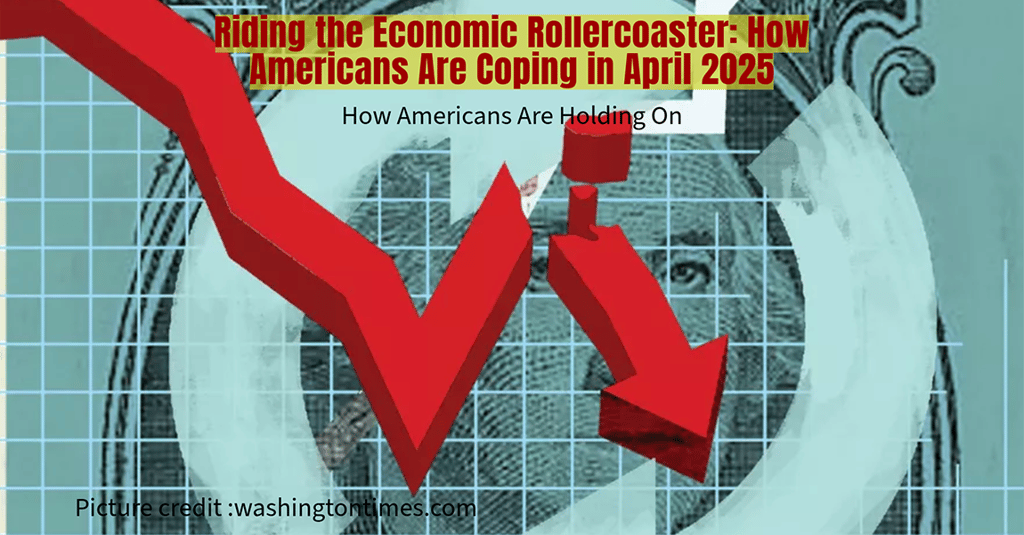Riding the Economic Rollercoaster: How Americans Are Coping in April 2025
4/22/20253 min read


Riding the Economic Rollercoaster: How Americans Are Coping in April 2025
Buckle up, America—the economy in April 2025 is a wild ride. Inflation is creeping up, consumer confidence is tanking, and trade wars are shaking things up. Yet, amidst the uncertainty, Americans are finding ways to navigate the turbulence. From rushing to buy big-ticket items to tightening their budgets, people are adapting to a challenging economic landscape. Let’s explore what’s driving this unease, how Americans are responding, and what the future might hold.
A Wave of Economic Pessimism
The mood across the country is somber. A majority of Americans feel their financial situation is deteriorating, with consumer sentiment hitting lows not seen since the early 1980s, according to Comerica Bank. Inflation fears are surging, fueled by trade tensions and tariffs that threaten to jack up prices. The job market, once a beacon of hope, is now a source of anxiety, with many believing quality jobs are scarce. This gloom is more than a feeling—it’s reshaping how people manage their money and plan for the future.
Trade Wars and Tariffs: The Storm’s Epicenter
At the core of this economic angst is a escalating trade war. The Trump administration’s tariffs on imports, especially from China, have triggered retaliatory measures, sending shockwaves through the economy. These policies are driving up costs for businesses and consumers, stoking fears of stagflation—a grim combo of sluggish growth and high inflation. The unpredictability of trade policies is spooking markets, curbing business investment, and leaving Americans bracing for higher prices at the checkout line.
How Americans Are Holding On
Despite the headwinds, Americans are taking action to weather the storm. Here’s how they’re coping:
Pull-Ahead Spending: Some are racing to buy big-ticket items like cars or appliances before tariffs push prices higher. This “buy now, save later” strategy is a savvy move to outpace inflation.
Seeking Financial Advice: Demand for financial planners is soaring as people seek guidance to protect their savings. From building emergency funds to tweaking investments, Americans are getting proactive.
Cutting Back: Many households are slashing discretionary spending—think fewer dinners out or canceled subscriptions—to stretch their budgets in the face of rising costs.
Navigating Uncertainty: With economic policies in flux, Americans are staying vigilant, adjusting to a landscape where volatility is the new normal.
The Road Ahead: Slower Growth, Bigger Questions
The economic outlook for the rest of 2025 isn’t rosy. Forecasters predict sluggish growth, with whispers of a possible recession by year’s end. The Federal Reserve is keeping a close eye on the situation, hinting at potential interest rate adjustments if the economy weakens further. Businesses, policymakers, and economists are all on high alert, knowing that the situation could shift rapidly. For now, Americans are left grappling with a complex and evolving reality, balancing caution with resilience.
Why It Matters
This economic rollercoaster isn’t just about numbers—it’s about people. Families are rethinking budgets, workers are eyeing job prospects warily, and consumers are second-guessing every purchase. The uncertainty seeping into daily life is palpable, yet it’s also sparking ingenuity. Whether it’s locking in purchases early or seeking expert advice, Americans are proving they can adapt to tough times. But with slower growth looming and inflation pressures mounting, the question remains: how much longer can they hold on?
What Can You Do?
For those feeling the economic pinch, small steps can make a big difference. Consider reviewing your budget to identify areas for savings, like cutting back on non-essentials. If you’re worried about inflation, talk to a financial advisor to explore inflation-resistant investments. And keep an eye on economic news—staying informed can help you anticipate changes and act swiftly. The economy may be turbulent, but proactive planning can keep you grounded.
The Bigger Picture
The challenges of April 2025 reflect a broader truth: economies are cyclical, and resilience is key. Trade wars and tariffs may dominate headlines, but they’re part of a larger dance of global markets and policies. As the Federal Reserve and policymakers navigate these waters, Americans are doing their part by adapting and preparing. The road ahead may be bumpy, but history shows that tough times often breed innovation and strength.
Thought Questions to Ponder
How are you adjusting your spending or saving habits in response to today’s economic challenges?
Do you think tariffs will help or hurt the U.S. economy in the long run? Why?
What steps can policymakers take to restore consumer confidence and stabilize the economy?
hello@boncopia.com
+13286036419
© 2025. All rights reserved.